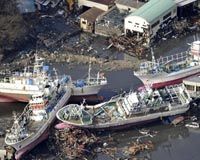| . |  |
. |
Rikuzentakata, Japan (AFP) March 20, 2011 Of all the day-to-day hardships suffered by survivors of Japan's tsunami, the simple everyday ritual of a bath -- so important in the nation's culture -- is the thing many say they miss the most. In a country where bathing is an elaborate and highly prized daily pleasure, the people of the washed-away city of Rikuzentakata now can only rinse their faces in cold water. Life for many is now lived in a school hall, with the only water coming from a small military tanker parked outside the entrance. "I haven't had a bath in a week," said Honami Suzuki. "That's one of the worst things about living in the shelter." About 1,000 of the 9,500 people left homeless in Rikuzentakata are holed up in Daiichi middle school, where volunteer Tsutomu Nakai is co-ordinating their care. "The lack of a bath is something that many of those staying here find difficult," said Nakai, whose own home was flattened. "Japanese people really enjoy having a bath. We can't do anything about it at the moment, but people have been very good. They don't like it, but they aren't complaining." Before the waves came on March 11, Rikuzentakata was a picturesque tourist spot on the coast of Iwate, an area dotted with "onsen" -- natural springs heated by the geologically unstable ground on which the country sits. In normal times, many Japanese spend their weekends or holidays visiting these baths, which can range from a simple ceramic- or wood-lined deep tub to elaborate open-air pools created from volcanic rock. Bathers must shower and scrub themselves scrupulously clean before climbing into the steaming pool, where they soak with friends or chat to fellow visitors. At home, the ritual of cleaning is equally important, with a nightly shower and bath. But for many of the estimated 380,000 people living in shelters, the once taken-for-granted soak is a pleasure they no longer have. Rinzo Chikutsu has slept on a makeshift bed on the floor of Daiichi middle school since his house was crushed in the 9.0-magnitude quake and ensuing tsunami. The 74-year-old says he is grateful for having somewhere to stay, even if conditions at the school are a little basic. "There is no hot water, so we can't get clean," he said. "I can wash my face, but only in cold water." Even those whose homes were spared the destructive force of the wave have been left without the means to bathe because there is no electricity, gas or water. "We have a small solar panel, which meant we could heat about half a bucket of water," said Shizue Oue, whose home still stands on a small hill overlooking the devastation wreaked by the tsunami in Rikuzentakata. "We could rinse ourselves, but we could only do it once and it wasn't very easy because there wasn't much water at all." But for some, it isn't the quiet pleasure of a warm bath that they miss, but the very real necessity of being clean. Kumiko Takahashi and her 18-month-old daughter Akiha are among those sheltering in the school. She has access to nappies and wipes, but is desperate to give her baby a bath. "There is no way to keep her clean," she said. "There's no water to wash the baby. It's really hard."
Share This Article With Planet Earth
Related Links Bringing Order To A World Of Disasters A world of storm and tempest When the Earth Quakes
 Desperation tests taboo on theft after Japan tsunami
Desperation tests taboo on theft after Japan tsunamiKamaishi, Japan (AFP) March 20, 2011 Isolated reports of looting by desperate tsunami survivors have emerged in Japan, whose people have been widely applauded for their discipline in the face of appalling adversity. Other countries have noted with admiration, and some envy, the almost total absence of social disorder following the massive March 11 earthquake and ensuing tsunami that has left nearly 20,000 people dead or missing ... read more |
|
| The content herein, unless otherwise known to be public domain, are Copyright 1995-2010 - SpaceDaily. AFP and UPI Wire Stories are copyright Agence France-Presse and United Press International. ESA Portal Reports are copyright European Space Agency. All NASA sourced material is public domain. Additional copyrights may apply in whole or part to other bona fide parties. Advertising does not imply endorsement,agreement or approval of any opinions, statements or information provided by SpaceDaily on any Web page published or hosted by SpaceDaily. Privacy Statement |